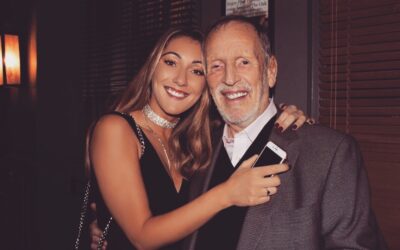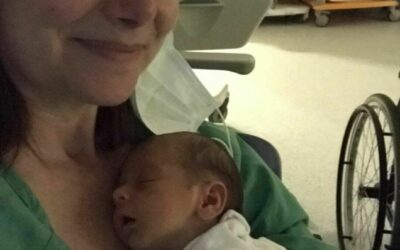Jodie Granger is an artist. In 2017 she was diagnosed with Guillain-Barre Syndrome (GBS), a disorder in which the body’s immune system attacks part of the peripheral nervous system. The syndrome is rare, affecting only one person in 100,000 but it can affect anybody. It can strike at any age and all genders are equally prone to the disorder. [1] Around 1 in 20 cases is fatal but most people will eventually make a full recovery. This can take weeks, months or years and some people are left with long-term problems. [2]
Jodie Granger: It all kind of started randomly on a Monday. I just remember feeling…the very first thing that I noticed was when I washed my hands it felt spiky. I remember having a bit hypersensitivity to the temperature in the water and I remember if it was particularly cold it would be, like, spiky so I was a bit like “ooh that’s a bit weird, maybe I’m just having a weird moment”. And then it stayed there, it progressed on the next day and it felt like there was something going on. So it was my hands and also in and around my mouth and then my feet started feeling funny as well and I could particularly notice it when I would get into bed again… it was a change of temperature… to the touch of the sheets it felt spiky and weird and cold like a flash of cold or something.
So on the Tuesday I went to the doctors and I was like “this feels weird”. They checked my reflexes and they had no idea. They were like “you can go, have a blood test if you want” I just went home and hoped it would be better the next day but the next day that weird change in sensation had spread all over my body so that was when I realised there was definitely something wrong wrong going on and I found it difficult to get out of bed or to start walking so I then went straight to King’s College Hospital to walk-in blood test centre.
I kind of panicked and they brought me to A&E (Accident and Emergency) and I stayed there for a bit and then had my blood tests and it all came back fine so I was sent home again and then the next day I didn’t want to get out of bed and I was throwing up. I was finding it difficult to get out of bed and go to the toilet: I had to push on… use my arms more… I remember using the wall to try and get there and then I was on the phone to my mum and said, and I don’t really remember this but she said, I sounded slurred so she was worried. She came up to London that evening and thought that I had a really bad fever or something so she was going to take me home until I get better but I got worse and the next day I really, really didn’t want to get out of bed because I couldn’t. I’d be grunting with the effort… “Why are my legs not…” the legs just weren’t… I couldn’t connect to them so it was a really big effort to do anything.
Pins and needles was another thing that came along with this as well… especially from the extremities up, from my feet and hands up and in and around my mouth outwards. So at this point I rang the doctors and they said go to A&E because you can’t walk very well and that was that. And then at 3am I was finally put onto a ward. A week sort of sounds fast and slow… it just got worse and worse.
I was admitted on a normal ward shared with other people and I spent a few days there getting gradually worse and worse and then GBS had been mentioned quite quickly at this point and the doctor came and she was the head of neurology. There’s a massive department in King’s College so it was really reassuring. Obviously my parents were freaking out, we were all freaking out because I couldn’t get up at this point to go to the toilet, I just had to be lying down.
“Just normal bodily functions were becoming less and less in my control”
My left side of my face went … My left side of my face decreased in movement and I couldn’t control it, and later my right side went.. It got more difficult to swallow, to eat and drink and things. It was a really big effort to use those muscles.
Just normal bodily functions were becoming less and less in my control and then a few days after I was admitted to ICU (intensive care unit) and they gradually explained to us that what might happen.. I would have been tested for loads of stuff (at this point), I would have had so many blood tests, I had a lumbar puncture, MRI (magnetic resonance imaging) scan, PET (positron emission tomograph) scan, all these things.
The lumbar puncture would have been to check what was going on in my central nervous system and that came back fine apart from there was an increase in the… something.. cell count I can’t remember so it wasn’t… One thing Dr Norwood could say was it wasn’t anything to do with my brain or spine. It was the connections to muscles that was being damaged. It was an auto immune response, because it was my own body that was attacking the myelin sheath… I actually learnt about this in biology. I found it all really interesting , the science behind it. So your neuropathic nerves have a myelin sheath which insulates the nerves and that was being damaged and without that insulation the messages couldn’t travel basically. If you Google it it will explain it with diagrams, it’s really interesting.
So the connections to my muscles weren’t happening. They were explaining all this to me. I was getting worse and worse, weaker and weaker, tireder and tireder. And they explained that at some point “it’s probably going to become more difficult for you to breathe because you’re not going to be able to…” the simple action of moving your chest up and down is essential to breathing and the speech and language therapists were involved quite quickly because my swallowing was becoming non existent so I would have had the NG (nasogastric) tube so I could be fed and they were like “you’re going to have to be intubated soon because you’re probably going to find it more and more difficult to breathe on your own’ and that’s what happened as I got weaker.
So I was intubated and at that point I was sedated so this is the hazy part where for a few days I was conscious … they still needed me to be conscious because they needed me to react to stuff because they were still testing me for things and they still needed my response but I don’t remember. The drugs I would I have been on at this point… the effect is to erase your memory because when you’ve got a tube going down your windpipe in your mouth it’s uncomfortable so I have weird memories of that.
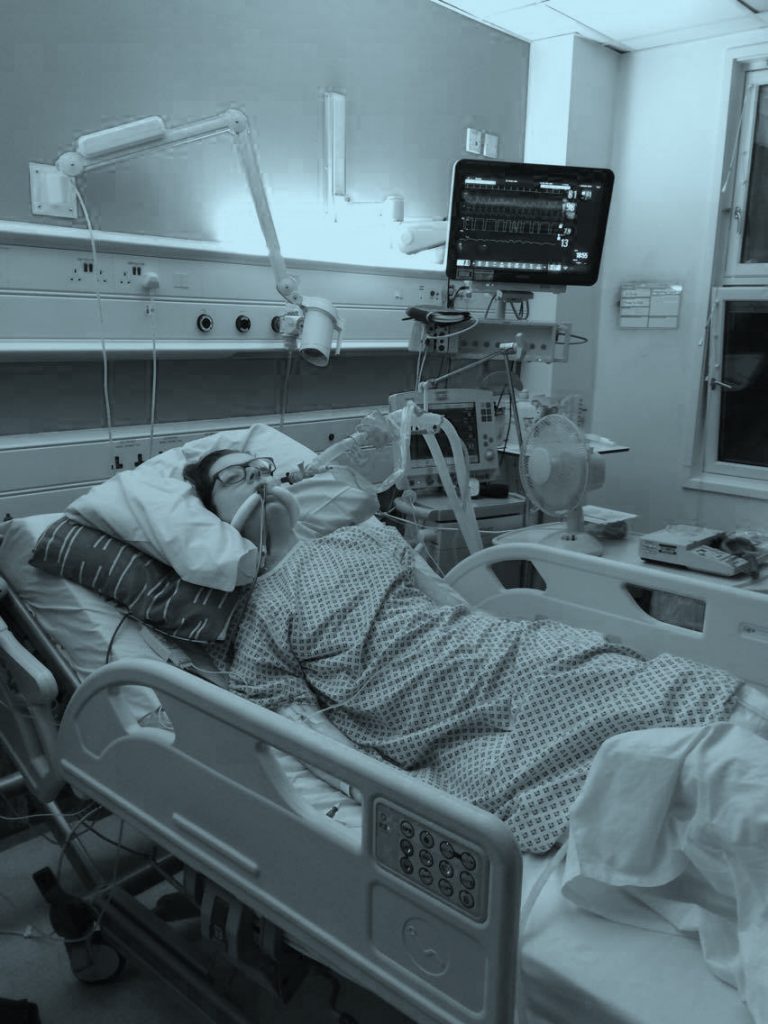
And I would have been sedated in order for the tracheostomy to happen. The ventilator was keeping me alive because I couldn’t breathe and it was essentially breathing for me – pushing air into the lungs and taking it out. The tracheostomy was essentially where I was going to be breathing through… so a tube attached to here (indicated throat) attached to the ventilator so at this point I couldn’t talk and I couldn’t move.
So communication was the very first thing after that… the way I was having to communicate was with a spell chart board. they would have to hold it… my eyelids wouldn’t close when I slept either so I had to have droplets to protect them… really thick coating on my eyes so my eyesight was really blurry… it was so hard to communicate this. So they had to hold it here and I would have been like this trying to read it and they would have had to go “one, two, three” (moving finger along the board) and the n I would have had to nod or shake my head.
I must have had a bit of movement in my head and my eyes were all… even though they had to protect my eyes with droplets, my eyesight wasn’t damaged apart from the muscles. When they checked my eyesight, they checked it all the time, if I looked up that would hurt. When I could start moving things imagine everywhere in your body has been bruised and it is all strained. So I could communicate with the spell chart, spelling out words letter by letter.

Hamish MacPherson: What would you be communicating about?
It would be in what way am I uncomfortable , what I need them to do. Part of the pain, it was a kind of neuropathic pain, it didn’t mean I wasn’t actually hot but my entire body was burning, it was the nerves doing that as they were being fixed or damaged so I would be repeating “burning. burning” so there would be a lot of input from pain management saying we need to try this concoction of drugs. At this point there’s something called IVIg – Intravenous Immunoglobulin – which you get treated for GBS with. It’s basically full of other people’s antibodies and it kickstarts the healing process. And I had this course and then I eventually had another course.
I would say if I needed changing positions or something because I’d still feel uncomfortable all the time and obviously in ICU if you’re bed-bound they need to turn you every four hours and that was quite a painful experience. And the more I was starting to heal the more pain I would experience like stiffness or bruising pain so when they would move me, it would get more and more uncomfortable and painful but it was really hard to communicate. I just had to explain it by spelling it out.
“I felt like there was always something in my mouth like a hair or something when there wasn’t”
When you have a tracheostomy there’s lots of focus on mouth care because you’re not getting any water going in or around your mouth so to begin with I would have massive amounts of saliva being produced so one of the things I’d spell out would be “suction” and they would have to suction my mouth a lot. And I had mouth thrush, I had pneumonia. They would talk about managing your secretions… so the reason why I had pneumonia in my chest was because there was a lot of mucus not being cleared because you can’t cough yourself you have to spell out “cough”. With the trachey there’s a little tubey thing, they push it down your trachea. It sounds horrible but it became a very normal thing so they put a little tube down your trachea which irritates it and then you involuntarily cough and they would suck up the mucus. I could not control any of this hygiene aspect of mouth, mouth care and lungs.
But then also my mouth would be unbearably dry, my lips would be chapped all the time and no amount of lip balm could fix that so that would be irritating. And the weird thing about what was happening with the senses and my mouth was that I felt like there was always something in my mouth like a hair or something when there wasn’t. I was obsessed. That would be another thing I would try to communicate about I’d be like “I’ve got something in my mouth there’s something in my face” when there wasn’t at all. It was something that I felt because of as the sensation was starting to come back – this is what they explained – I would just have every weird feeling you could possibly imagine with temperature, touch, all the pins and needles weirdness, I would experience that everywhere.
Some of the nurses knew exactly how to use it (the spell chart) and they were great every single one of them but I remember a nurse would have held it there (at right angles to her face) and I couldn’t tell them to move to closer without being able to see the spell so it would be insane.
Was that frustrating?
It was the most angry… I’ve never experienced such intense anxiousness about sleeping, about pain, about going to the toilet. If I felt a strain or pins and needles or something I needed to explain to them where it was that I was feeling it and how to fix it but it was so hard because I didn’t know myself where it was because I had no sense of orientation of my body because it was all just disconnected.
Was the care team consistent over time?
Yeah. I had occupational therapists, physical therapists, speech and language therapists, each of them would visit me once a day and then the nurses are on a rota so you get one nurse to each patient in the ICU, one during the day and then they swap for a night nurse so you’re constantly under care and I would have gotten to know the team on that particular ICU I would have had the same nurse more than once so in that way it got consistent but the anxiousness levels… especially during the night when my parents weren’t there to help me communicate.
Before my parents would leave, I had this little book which is what I made my parents write in all these different phrases so I didn’t have to spell then out again and again so I would be obsessed with my parents – “get them to see the book, they have to read the book” a fear thing at that time, please show me the book and then point to the phrase because I always needed this repetitive thing but the physical therapists and speech and language therapists and occupational therapists they were great.
“Imagine having no muscles, it felt like I had no muscles to move”
You had to be really determined to do physio. To start off with I couldn’t do a lot of physio, I couldn’t move very much but when I regained… the first physio I would’ve gotten was they support my elbow and my hand and moved it upwards so it’s just this flexion, they would support my wrist here and I would kind of try and lift my arm but I’d be trying to with all my might. It was kind of I’d be really intensely looking at what I was trying to move, it was super weird, imagine having no muscles, it felt like I had no muscles to move it.
It was this action and (demonstrates shoulder abduction – raising her bent arm sideways from shoulder) bringing the elbow out so they would support both here (elbow) and here (forearm).
And then also lift this bit as well (raising her bent arm forwards from shoulder). So that was kind of like an arm exercise that my dad helped me do throughout the day as well. And it sort of progressed into other stuff. Oh yeah I had a sponge.. to do with dexterity… dad or whoever would support my wrist and then I’d grab the sponge and then try and lift your wrist up and down. It’s so weird looking at myself doing this now and thinking about it. It is insane how I wasn’t able just to do that action as easily as I can now. My dad says he remembers my knuckles would be going white.
To begin with I couldn’t really move my head or neck a little bit side to side, that would be something that the physios would say to practice. I couldn’t properly move my mouth very well. If I tried to mouth something at this point it wouldn’t have come across. My right side came back first and it was followed by my left side so I was lopsided for a while.
There’s so many areas of the body that I had to work out how to gain access to. There was the arm stuff, the communication, I had to have several enemas because I couldn’t go. So the top half of the body was coming back first and the lower half was following, taking longer.
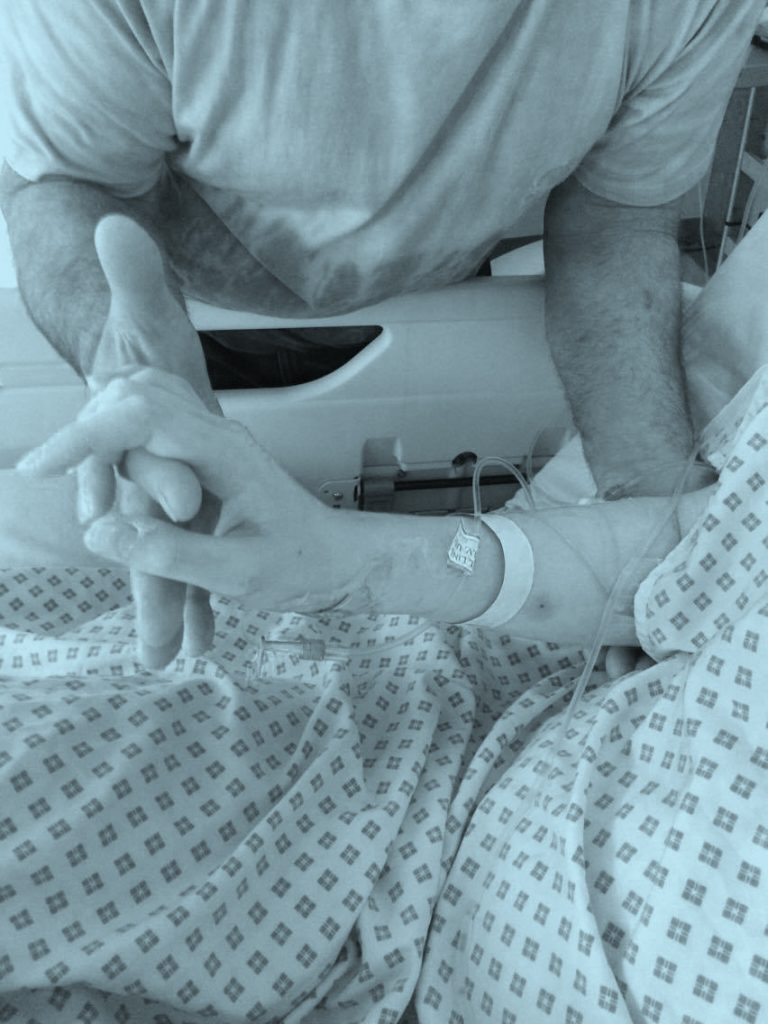
Where are we in terms of time?
I’d say this was the second or third week. I was in ICU for a total of five weeks so around the third week.
So I would have treatment, and then eventually they would have started doing similar exercises with my legs. Holding my ankles, trying to flex my ankle back and forth push away the physio, my dad or someone They would have their hand by my foot going “push push push” and I’d be trying my damnedest and I remember especially then I’d be looking at it focusing on it.
All this time I would be monitored every day, for my progress.
They would be like “can you wiggle your toes?”
And then to begin with I wouldn’t be able to see it so I’d be “am I doing it? I don’t know.”
They’d be “it was just a flicker” but each time they would ask I would be able to do it a bit more and that’s when they could start working with my feet… (recording cuts out) …back and forth, try to spell out words with your toes with your feet and in general trying to get it moving and then with my legs it was.. they would be supporting the joints and I would be trying to move that joint that they were supporting as they are helping me lift it up as well..it would be like “lift up your knees on the bed as far as I could then they would be “push it straight as hard as you can”.
TO begin with it I would bend up my knee and then it would be all very jolty as all the connections.. I would describe it as all my muscles weren’t in synch with each other which was why it was all jolty because not all the connections had been remade. I would have described it as darting in different directions and then eventually they would have all been joining up together over time. And as this was progressing, communication-wise I’m getting better because I can have the spell chart on my lap and if I’m sat up on the bed I could point with my finger so things were getting better communication-wise. And then I was practicing spelling each letter on my leg.
Drawing the shape on your leg?
Yes drawing the shape on my leg. There was quite good physio on dexterity as well. I was probably less frustrated at the pace of things, I would have thought “my legs aren’t getting better, my arms might be getting a bit better but a this point I’m not going to be able to walk in two or three months from now. Maybe if I’m lucky”.
I would have had these amazing boots on all the time I would have had compression sock and massage-y attachments which blow up air and massage your legs to try and pump the blood back up the body. And I would have had boots on as well to stop heel sores and ankle floppiness, I would have these boots on that were kind of annoying because they were in the way and sometimes a bit uncomfortable but I had to have them on.
And then at one point I was lying on my side and I had a visitor and I suddenly tried to move my legs and then they sort of went like that… (demonstrates flexing at the knee) …and when that happened we were all quite shocked. We were like “uh!” It was pretty amazing.
“You have to regain your confidence, so you can bear being upright again”
And then around that time they would have been sitting me out in the chair, trying to get my body more used to being upright because I was so flat most of the time. You have to regain your confidence, so you can bear being upright again. So I would have been sitting out in my chair which would have been painful – it was like the chair was quite hard, it felt like my body was really heavy and it was on the chair and it was pushing me against all my bones and things. It felt like that was a lot of pressure. I couldn’t tolerate the chair for very long. There was one point where I was sat in the chair and I was moaning and groaning, “I’m not getting any better”, and then I would have suddenly kicked and then “ahh there’s life there” so that was good.
You saw that?
I saw that and then my dad and then my mum have visited and then I would have showed the nurses.
It made you realise things could be quicker than you had thought?
It was at this point, maybe the fourth week, things were turning around. There were a lot of positives each day.
All along this process there’s the weaning process off of the ventilator so I would have tried things like CPAP I can’t remember what that stands for (Continuous positive airway pressure therapy) I also had a speech valve attached to the trachey valve which would allow me to talk. So at this point things were getting better because I was able to communicate more and more about my pain and what I want to do or what I need or my thoughts so I was able to communicate. Things were getting in general more happy.
So I would have spent longer and longer times on the speech valve but to begin with you can only tolerate ten minutes because it’s less support and basically what happens is with the trachey the reason you can’t talk is there is a rubber… or something that is inflated over your voice box so it blocks any air passage going past your voice box. SO with the speech valve they deflate it so that air is now coming through this hole and passing back and forth through your mouth. So for this entire time imagine this has all been blocked and it is all coming this through this hole (in her neck).
And then eventually my swallowing sensation was coming back so then I was able to drink water and eat so that was really good and I was getting stronger and stronger and then the next stage of physiotherapy would have been something like sitting on the edge of the bed so then it was testing core muscles and butt muscles and lifting my head. They’d be like “get your legs to the edge of the bed” so step by step I’d get them closer and then they’d try and help me swing round onto the edge of the bed, hold my back, hold me behind me and support my legs and someone has to hold the trachey as well so I’d be practicing sitting upright and at this time that was quite painful because I had the muscles but they were very small or they weren’t in synch because when I was sat up I’d be quite wobbly and jolty and in my legs there was a lot of difficulty from hip flexion. They were like “lift up your knees then flex your legs out”.
Also we started doing reaching so getting up here (raising straight arm from the shoulder) as high as possible. I couldn’t do it, and there would be strained muscles everywhere here (indicates to her arm and torso) but obviously you had to engage with it because otherwise I don’t know how I would have got better or regained my strength. There were all these little details of the physio.
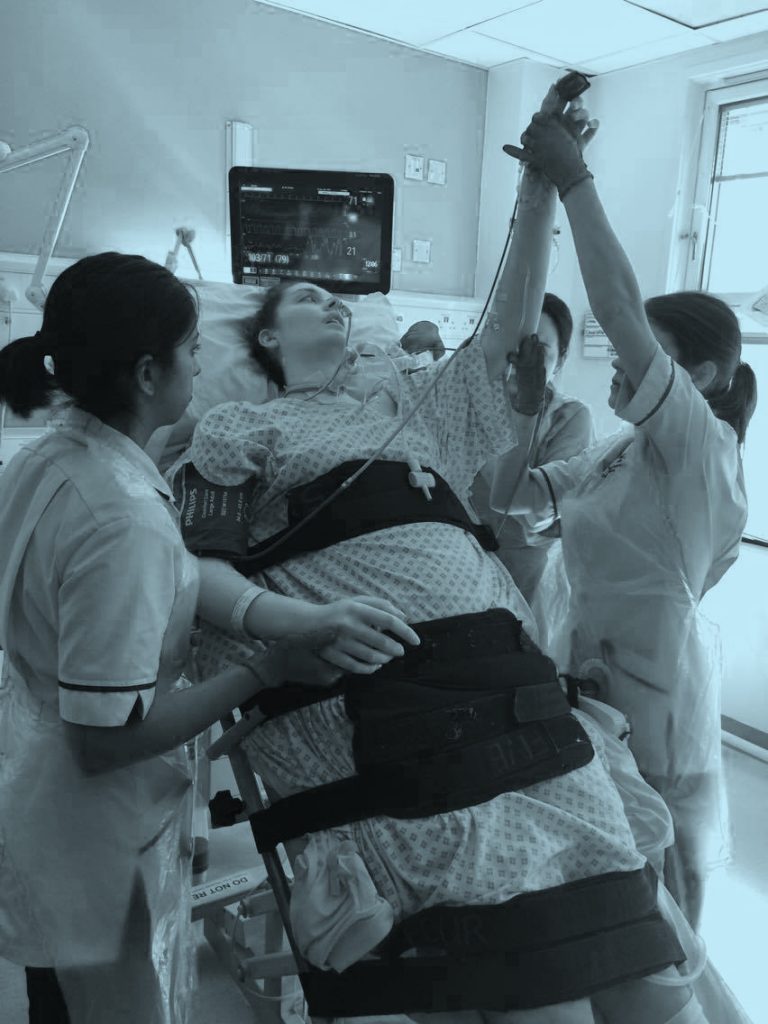
What I had to do was go through stages of being able to tolerate it while I was asleep as well because I had a period when I would stop breathing when I was on the ventilator, I’d be in a really deep sleep it could have been partly because I was using this sleeping pill, that could have been sending me into a really deep sleep. They call it sleep apnea which just means you stop breathing sometimes when you’re asleep and what the ventilator does is it has a timer so if you stop breathing… I can’t remember how many seconds would go by… then it would kick itself. In a way you’re using the ventilator… it’s called triggering the breath… you have to trigger the breath but then if you’re not breathing then it does it for you.
I needed to go without a night of not breathing and then tolerate with the Optiflow and then after the Optiflow it was just a little mask over the whole that gave you a bit of oxygen but they said to me that it’s essentially you that’s doing all the breathing so at this point it was really good.. I’d moved rooms to a room where instead of two nurses there was one nurse to two people. They said the only thing that was keeping me in ICU was the ventilator and tracheotomy so they had to take that out before I could leave ICU and go to the neurology ward.

At this point I am getting a lot lot stronger and then there was something called a Sara Steady. You sit on the edge of the bed and there were two handles, you grab them, you step up onto it and then you’d have to actively have to try and pull yourself up like that and they would support you and push you up as well but you had to push down your legs and pull yourself up so that would have been the first time I’d been standing up.
At this point it was really, really positive but that was really strange because my body wasn’t used to that… it didn’t really agree with it because you have postural hypertension, the feeling when you stand up too quickly and you feel faint but I would have that quite bad, quite intensely so again you have to increase your tolerance of being upright and standing so I would be practicing that with the physios.
It was good because with the Sara Steady you could stand up on it and then they could slide seat underneath your bum and then they could wheel you around. Also at this point this was the first time I could be taken from my bed and the first time I would have had a proper shower so that was amazing. At this point it would have been the fifth week in hospital. The way they wash you before is they just wipe you because you can’t get to the shower. And that was a weird thing. Earlier on I really did not like that because it would sting like horribly when I was being wiped.
Because of the chemicals in the wipes?
I think it was the texture, so the harder I was getting wiped it would be stinging, the same towel, give me intense pins and needles. And for a while I didn’t mention it because I felt bad.
And eventually I communicated that but at this point it was getting more tolerable, less painful I should have told them about that sooner.. it was something that I really hated, they have to wash you every day and… go I hated that…
Why were you reluctant to mention it?
Because I felt rude. I felt bad because they have to take care of you have to done everything for you. I just winced and let them carry on…
And at this point I was able to brush my own hair. For ages they managing my hair was difficult thing because it was really, really matte to begin with and I couldn’t lift up my arm to my head and my mum has short hair so she has no idea how to manage long hair so for ages no one was properly brushing it out, no one was washing it properly or brushing it before it was being washed so it properly matted and at one point I really wanted to say “look can you just chop all my hair off.” I really hated that. But then eventually that got better and people were brushing it through because I was able to communicate to them.
The only relief I had (from pain) was from fentanyl which is a similar drug to morphine; super powerful and worked straight away so if I was feeling the burning sensation or if I was uncomfortable, if my pain was seven… seven was the highest I ever gave it because I tried to be modest with the pain scale, I was trying to be really, really honest but obviously when I was seven I was probably in my most pain, it was the burning sensation that was really painful so the fentanyl just washes over you and it was the only relief from that particular pain, straight away but it would only work for about 15 minutes and then you gradually come back to where you were but you could only have it every four hours. I obviously really loved this drug.
Did you administer it yourself?
No they have a lot of… that was another thing; they had a lot of difficulty getting blood from me, cannulating me and just in general… they would fail a lot, they had to have several attempt to get blood from me or to cannulate me – a cannula is a flimsy thing only lasts about three days so I would have been stabbed so many times that my arms were black and blue. There was soemthing called an arterial line that was for taking blood, and measuring pressure and O2 levels and stuff like that.
And when they decided to administer me with the full course of trexone which is the antibiotic for lymes disease they put a picc line in which is like a large cannula that lasts for ages. The cannula is a little tube that goes into a vein but the picc line goes into a really deep vein, all the way up your arm and into the top of your heart so I had to have surgery for that. That was the most painful thing, they failed the first attempt but that process took about half an hour and it was constant pain. I had three local anaesthetics cause I was still feeling a lot of pain but once that was in it was great they because could do because they could do everything from that line.
So at this point I’m coming out of ICU ’cause I was good to take the trachey out, it was amazing they literally pop it out, slap a plaster on and it heals on its own, no stitches or anything it’s amazing.
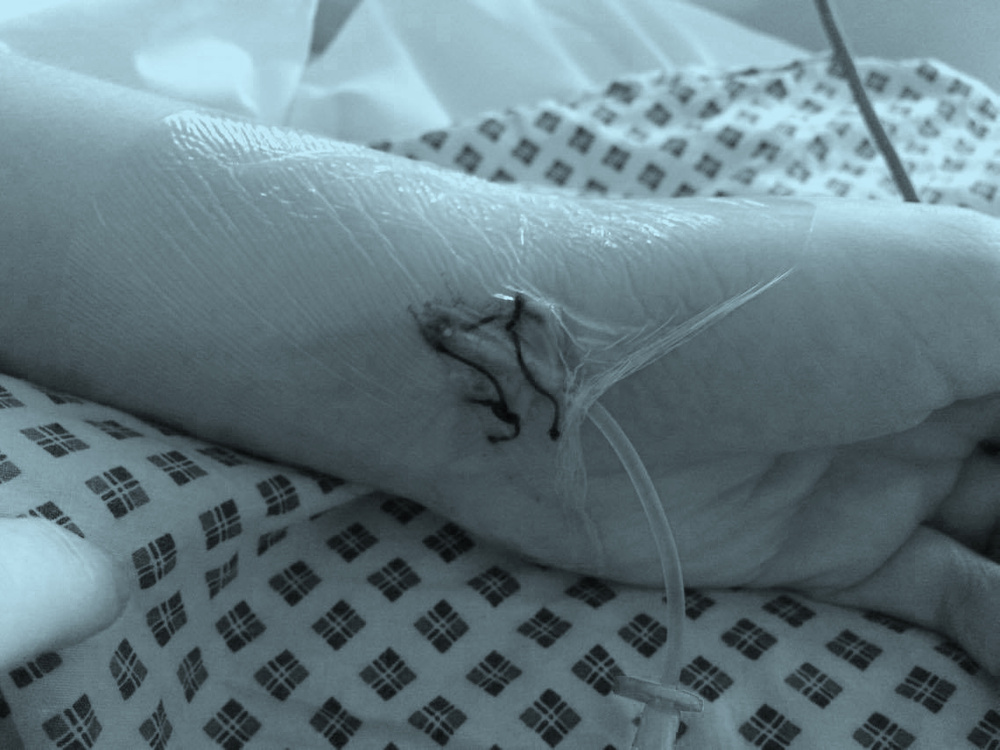
So once that was gone things were moving really, really fast at this point, or it felt like that. This is what my doctor said “Jodie’s going to get worse then she’s going to plateau then she’s going to gradually get better and then it progressively got better and better which was really good. And then I moved onto the neurology ward. I was in a room with three other patients, there’s a nurse between two rooms with nursing assistants. They warn you “it’s very different to ICU” where you have care 24-7 right there for you. So it feels like you’ve been left. Eventually you get used to that too.
And at this point I’m doing more and more physio, I’m using the Sara Steady a lot and then eventually a few days in they try and get me to walk. And I’m getting support on both sides stood up and I’d be shuffling my feet to begin with and they’d pull a chair behind me in case I needed top sit down so I could get to the door, then get to the window over a few days. And then I could walk out to the hallway a little bit and then I could walk a bit further.
So we measured my progress in how far I could walk. In that way the progress was becoming more and more clear. Then I had to stop standing up and feeling really faint; I had to get more tolerant in standing up, walking more.. they were like “try and concentrate on lifting your leg instead of shuffling” like I used zimmer frame for one day and they were like “actually don’t use that because you’re walking better without it”.
So this probably the first time I’ve regained some part of independence because I was given the “yes” to be able to get out of bed myself and maybe sit in the chair or go to the toilet. And I could practice that any time I wanted really. My occupational time in this area was going faster because I could do more. For ages I couldn’t read because I couldn’t hold a book because I was too shaky to do so or I couldn’t use my phone. But one point back in ICU my dexterity does get better that I can move and text or watch something on an iPad or read.
So my time was getting better, I was less anxious about things and there were far more distractions that I could do but for ages I couldn’t do any of these things and I’d be in such a bad mood. The nurses would try and make me feel better by saying “do you want me to put on some music, do you want this.. or that..” and I’d be like “No! I don’t want any of this because I’m really sad” or something but that all got better and the next things would have been stairs.
One thing that was really amazing, I was finally able to use a wheelchair and I could be wheeled out of the hospital, my parents could take me. I’d go out every day, that was quite an emotional thing because I hadn’t been outside for.. it was like the seventh week or sixth week.
That was a really weird thing, just going into nature again and I felt like.. have you ever watched The Secret Garden or read it? I felt like the little boy in the wheelchair that goes into the secret garden. So that was really nice. Mentality-wise that was really amazing, we could practice me standing a bit in the park or doing a little walk. By this time my sense of humour got much better as well; we’d be joking about all kinds of things because it was a way of dealing with it all and it was just a positive turnout. And everyone, my family, my friends was so glad I was getting better and better and out of ICU.
So things were getting better and better, they were progressing and eventually when I could use the stairs, a few days after that the doctor was then like “you’re ready to go home now.” So for ages they were talking about me going to a recovery house… what’s it called… for more intense physio but I went past that point of needing that because I could use stairs the doctor was like “you’d be bored there.”
“I had age on my side, fitness, health, everything on my side”
I went to Cornwall, my parents took me home. My mum had stayed the entire time in my student house. She didn’t go home. It was all very emotional as you can imagine. A few days into me being into hospital my mum was like “No I can’t do this on my own you have to come up” so my parents were staying in my student house but my dad had gone home to help out with farming a little bit but he would always come back. He came back and we all went home together on the train.
From then on I could do stairs, they were very hard to do. If I was on my feet a lot my feet would swell up something to do with water retention, my ankles would get puffy so I had to elevate them so there was a lot of resting. Three weeks in Cornwall resting, catching up with people, trying to chill out but also trying to physically get something going on.
After one week in Cornwall I started going to the gym again to see what I could do. Before then I was as well as contact improvisation I was really into the gym, weight training I love it. I was super, super strong. I would have gone into hospital really fit. I had age on my side, fitness health, everything on my side. All of thesse factors would have been why my recovery was probably a bit quicker than most people with GBS. Considering it happened with my whole body. Sometimes it doesn’t happen to the entire body. I was eight weeks in hospital, that was not really as much as I would imagine when it was all really bad, I was like “I’m going to be in here forever.”
So I was at the gym and it was quite frustrating. I still struggle with lunges because my feet are still a bit tingly a bit weird on the bottom and the toes, sort of numb so I find it hard to balance with things. You know when you put in a pair of trousers and stand in one leg, I tip over a little bit. Some of these things are a lot better now but it was kind of like starting from square one. But the more and more I did it the more I noticed improvement so I had to keep focusing on that, I try to do as much exercise as possible but also be careful with the weights and things and things. My core muscles are rubbish…
(The next day I sent Jodie some follow up questions by email)
I know you practice Contact Improvisation (CI) and so I was wondering what kind of perspective that gives you on the ways that the care team would touch you and “read” you physically
Honestly I guess it’s a strange comparison because they work in different relationship dynamics; when I think about it, I felt more safe/ comfortable practicing CI before going into hospital than I did when I was almost immobile in a bed and having to have people move myself for me, as my doctor used the word herself, I was “floppy”, which is not the case at all I find in CI, as a lot of the time I try to practice following more of an instinctive/reflex flow in jamming or interacting. In the beginning it would be very difficult for the care team to read me physically; they would only know if I was in discomfort due to a particular move or touch me until after they would look up and notice my expression/eyes/mouthing attempts trying to tell them that something’s wrong or “change position”, and then try to remedy the action.
In CI I barely notice what people’s faces are doing! But actually I sometimes notice what their eyes might be doing, often catching it from my peripheral vision, whilst the rest of me is “seeing” through touch, pressure, skin.
It seems that at the most extreme point you were unable to move much at all – perhaps your eyelids, but not the automatic movements of breathing. But you also said (after the interview) that you are reluctant to describe this as paralysis. Can you say a bit more about that distinction?
When I think of paralysis, to me it associates with the central nervous system, the brain and spine, which was from the very beginning, as tested for via a lumbar puncture, something that hadn’t been affected or gone wrong in my case; mine was to do with the connections to the outer muscles. I also think in the grand scheme of things what I experienced didn’t last very long, and paralysis to me sounds more of a permanent, or at least longer lasting situation, and as a family too we didn’t want to tell our loved ones that I was paralysed, probably because we didn’t want to believe it to be so either. Perhaps it even became a certain defiance to not use the word.
You mentioned a passive-aggressive nurse (not covered in the above transcript) – can you tell me about that?
Well, she was lovely and all and did absolutely brilliant in looking after me, but there this one time in the middle of the night when I woke up to the trachey tubes having leaked all over my neck and I tried to tell her what it was and to help me and she seemed very dismissive and almost didn’t believe it was the tubing. Also later that night, when I was struggling to get in a comfortable position, whilst one nurse was trying her best and being very sympathetic, my nurse was again dismissive saying “I think she just needs to sleep I think she’s just tired”, when I was clearly quite worked up and upset. Since then, the atmosphere just felt a bit weird around us, we were nice to each other, but I didn’t know how much of it felt genuine anymore.
Can you say something about being alone. How care, especially intensive care often involves contact and proximity and yet solitude is perhaps an important part of being a person.
Hmmmm I feel like this is a big question and probably one of the most difficult, I’ve been stewing over it a lot, and I’ve had it in my mind for a few years even before hospital; the whole subject of loneliness and it’s necessity as well as the pain it can cause and drive people to. When I was at my worst in hospital, I needed people, in an obvious way for all the functions to keep my body going, but strongly in an emotional way, for distraction and support. I would look at the clock just waiting for my parents to come in in the morning. And I would be extremely anxious if in the middle of the night when my nurse had gone onto a break and I wouldn’t be bale to get the other nurse’s attention from the other side of the room. When I realised when the tables turned and I longed for the solitude, was indeed when my friend died, and I wanted to run away somewhere and shout and cry but all I could do was stay in this one room and I couldn’t even weep properly and let go without people being around; I just longed for the solitude to cry without anyone there to watch or hear me for once. So I had to wait in a way for that release after being in hospital to really grieve.
Do you feel you have gained insights into bodymind? Towards the end of our conversation you were talking about thinking and acting and about expressing anger but maybe there are other things too.
On the subject of bodymind, I’m still trying to figure out what I might have learnt from it in that sense. It’s all very hard to analyse and I’m still experiencing the mental and emotional affects of what happened, and I believe that therefore my body is still being affected. I find consciousness very interesting, and my consciousness wouldn’t have been functioning in the “normal” day to day kind of consciousness that we need in order to get things done and live out our lives. That wasn’t happening, I wasn’t in that state, it was another state, but I’m still trying to figure out what that state was. My body felt alien to my mind because there was no connection, in terms of movement/ sensation. When we live healthily, what I possibly believe, is that there is no line between the body and mind.
How was it to be so obviously dependent on people and things?
My dependency on others, in order not to go absolutely nuts in my head, was very intense indeed in the worst ways. It made me the most anxious I’ve ever felt, and even sometimes unsafe. Unsafe not a way that was to do with the careful hands I was in, because I was in exceptionally good care, but because of the experience of pure helplessness and inability to do the most menial, specific, little tasks to relieve the body/self myself when I wanted to. The desire to fix something or adjust was unbearable, that large desire had to be transferred to others and the fear was that that desire to function wouldn’t ever be fulfilled.
“It became normal to watch certain objects being used to extract or insert fluid outside/inside my body”
Objects and materials seem to play a big part in your artistic practice and also your treatment involved lots of specific objects – cannula, Sara Steady, wipes etc. Can you say anything more about the kind of relationships you developed with objects, textures and forms while in hospital.
I guess this makes me think about the sanitation of care when it comes to objects use; everything has to be sterile, so there are systems and processes in place that the people who work in healthcare have to follow, and it became this repetitive notion that I would be watching everyday and expecting, and observing the objects that had to be used on me. It became normal to watch certain objects being used to extract or insert fluid outside/inside my body; there was increased access and exchange between interior and exterior body via these objects, such as plastic, needles, tubes etc, so they became very familiar when before it would have been considered “less normal”.
I found the texture of being washed/wiped in the early days to be very uncomfortable and sometimes painful, due to the abnormal sensations picked up by my receptors, which would cause a lot of stinging and aching experiences. I also found the compression socks, massage straps, and boots I had on my legs quite over-cumbersome and hot, and worried if I had them on all the time I wouldn’t be able to do any physio, but eventually as I got stronger in the lower half of my body, things really took off in terms of recovery so they didn’t really get in the way, just had to let time do it’s thing.
- The National Institute of Neurological Disorders and Stroke (2011) “Guillain-Barre Syndrome Fact Sheet” https://www.ninds.nih.gov/Disorders/Patient-Caregiver-Education/Fact-Sheets/Guillain-Barr%C3%A9-Syndrome-Fact-Sheet#3139_5
- The National Health Service (unknown) Guillain-Barre syndrome http://www.nhs.uk/Conditions/Guillain-Barre-syndrome/Pages/Introduction.aspx
June 2017. This interview has been lightly edited for clarity.


